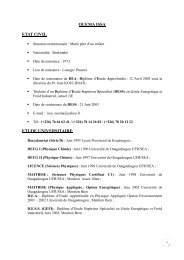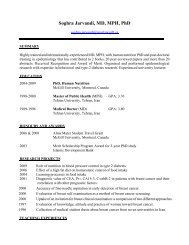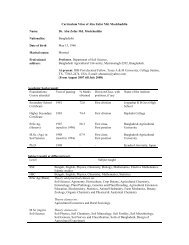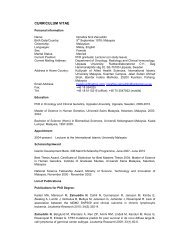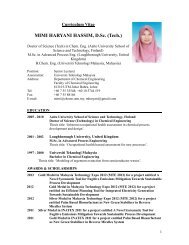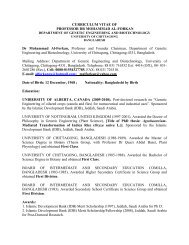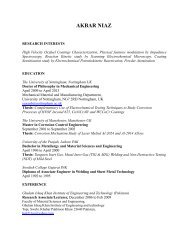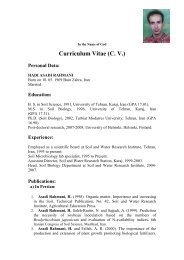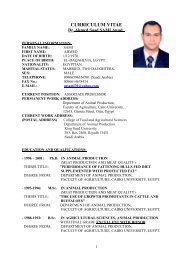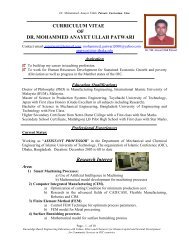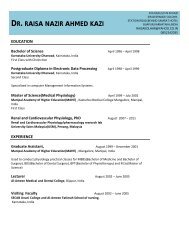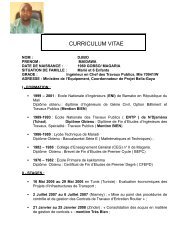Engineering: issues, challenges and opportunities for development ...
Engineering: issues, challenges and opportunities for development ...
Engineering: issues, challenges and opportunities for development ...
You also want an ePaper? Increase the reach of your titles
YUMPU automatically turns print PDFs into web optimized ePapers that Google loves.
ENGINEERING: ISSUES CHALLENGES AND OPPORTUNITIES FOR DEVELOPMENTISSUES• Awareness of quality <strong>and</strong> quality features, <strong>and</strong> the importance of efficient water use <strong>and</strong> waterconservation should be conveyed to all elements of the population. This will lead to more efficientwater dem<strong>and</strong> patterns <strong>and</strong> improve water resource management across all sectors, especially in theagriculture sector.CHALLENGES• Implement appropriate low-cost <strong>and</strong> environmentally sustainable water-use <strong>and</strong> supplytechnologies, <strong>and</strong> develop capacities in areas of water desalination, treatment of contaminants,rainwater harvesting <strong>and</strong> efficient water use. This should be achieved through technologytransfers, capacity building <strong>and</strong> the sharing of best practices.Water <strong>and</strong> sanitation• Irrigation projects that improve food production should be promoted. Subject to health <strong>and</strong>environmental st<strong>and</strong>ards <strong>and</strong> regulations, use of greywater should be encouraged <strong>for</strong> certain irrigationor industrial purposes.• Technology transfer on potable-water production <strong>and</strong> treatment, sanitation, wastewatertreatment, effluent water reuse <strong>and</strong> residuals management is required, particularly in developingcountries. In rural areas, on-site sanitation infrastructure represents a crucial contributor toward waterresource-management <strong>and</strong> the safety, <strong>and</strong> security of potable water supply.• Assess the impact of natural disasters, climate change <strong>and</strong> climate variability on surface <strong>and</strong>groundwater resources, water supply, <strong>and</strong> sanitation, implement monitoring <strong>and</strong> early warningsystems, <strong>and</strong> identify relevant mitigation <strong>and</strong> adaptive technologies.• Strengthen regulations <strong>and</strong> policies that dictate the prevention of pollution resulting fromwastewater discharges, solid-waste disposal, <strong>and</strong> industrial <strong>and</strong> agricultural activities.• Protect the ecosystems <strong>and</strong> acknowledge their critical role. Rehabilitate catchment areas bymanaging <strong>and</strong> regulating water flows, <strong>and</strong> improving water quality.• Develop low-cost <strong>and</strong> efficient drinking-water <strong>and</strong> wastewater treatment technologies,including <strong>for</strong> water quality <strong>and</strong> reuse.• Ensure effective human capacity <strong>and</strong> knowledge capability <strong>for</strong> building, operating <strong>and</strong>maintaining sanitation <strong>and</strong> sewer systems.• Energy-supply planning should consider all sources of energy based on mature <strong>and</strong> feasibletechnologies, while ensuring acceptable discharge limit (GHG) emissions. Development of carbonsequestrationschemes requires urgent implementation.• Make access to reliable <strong>and</strong> af<strong>for</strong>dable energy services available to all, with particularattention to the rural <strong>and</strong> urban poor.Energy• The optimal energy mix <strong>for</strong> any country depends on its available natural resource bases,population distribution, growth of energy dem<strong>and</strong>, <strong>and</strong> the status of its technical <strong>and</strong> economiccapability.• Develop <strong>and</strong> use advanced <strong>and</strong> cleaner fossil-fuel technologies. Develop other clean energysources to decrease dependence on fossil fuels.• Unattainable patterns of consumption – especially in the transportation sector –need to bechanged to assure energy efficiency.• Health risks from environmental pollution must be dramatically reduced <strong>and</strong>, in particular, indoorairpollution from burning biomass in confined spaces must be eliminated. In the transportationsector in developing countries, lead <strong>and</strong> sulfur must be phased out from use in gasoline.• Improve energy efficiency in households, the transport sector <strong>and</strong> industry.• Innovative bio-fuel technologies can make crucial contributions to decreased dependenceon fossil fuels <strong>for</strong> transportation <strong>and</strong> to lowering GHG emissions.• Minimise the human impacts of mining, <strong>and</strong> address safe <strong>and</strong> sustainable livelihood<strong>opportunities</strong> in small-scale mining ventures.Health• Pollution in agriculture should be reduced with the application of new waste treatment <strong>and</strong>management technologies.• Thoroughly implement technologies to prevent or contain marine pollution.• Adequate treatment, disinfection, <strong>and</strong> proper operation <strong>and</strong> maintenance procedures are to beused to prevent waterborne diseases from entering the distribution system.• Substantially reduce burning low-quality biomass in confined spaces. Thoroughly implementlow-cost <strong>and</strong> efficient ventilation technologies <strong>for</strong> uses in the poorer communities.Agriculture productivity• Sustainable agriculture <strong>and</strong> rural <strong>development</strong> need to be exp<strong>and</strong>ed to increase food production,to enhance food security <strong>and</strong> to reduce hunger.• There is urgent need to implement programs to prevent l<strong>and</strong> degradation <strong>and</strong> erosion, <strong>and</strong> toimprove soil fertility <strong>and</strong> agricultural pest controls.• Specific technologies to allow <strong>development</strong> of small-scale aquaculture <strong>and</strong> sustainable coastal <strong>and</strong>small-scale fishing activities, mainly in small isl<strong>and</strong> states, will require international support.• Increase public <strong>and</strong> private finance <strong>for</strong> sustainable agriculture <strong>and</strong> agricultural research.• Require policies <strong>for</strong> sustainable management of l<strong>and</strong> <strong>and</strong> other agricultural resources indeveloping countries.Biodiversity <strong>and</strong> ecosystem management• National <strong>development</strong> policies should give high priority to technical <strong>and</strong> financial support todeveloping countries <strong>for</strong> conservation <strong>and</strong> sustainable use of biological resources. This should occurwhile ensuring fair <strong>and</strong> equitable sharing of benefits arising from utilisation of genetic resources.• A significant reduction in the current rate of loss of biological diversity is required, along withstrengthened control of invasive alien species.• Marine environmental protection needs to be strengthened <strong>and</strong> a network of marine protectedareas should be implemented worldwide. The ecosystem approach in fisheries <strong>and</strong> in marinebiological diversity should be broadly applied.• The protection of ecologically sensitive areas <strong>and</strong> natural heritage requires a special worldwidetreatment.• Carry out application <strong>and</strong> <strong>development</strong> of the ecosystem approach <strong>for</strong> biodiversitymanagement.• Require Environmental Impact Analysis <strong>and</strong> Project Life Cycle Planning <strong>for</strong> mine<strong>development</strong> be<strong>for</strong>e starting extraction of mineral resources.• Provide financial <strong>and</strong> technical capacity to improve value-added processing, to upgradescientific <strong>and</strong> technological in<strong>for</strong>mation, <strong>and</strong> to reclaim <strong>and</strong> rehabilitate degraded sites.• Transfer of marine science <strong>and</strong> technology to maintain or restore depleted fish stocks tolevels of sustainable yield.• Support natural resources management, including addressing environmental economic <strong>and</strong> socialimpacts of mining operations, is essential.262



